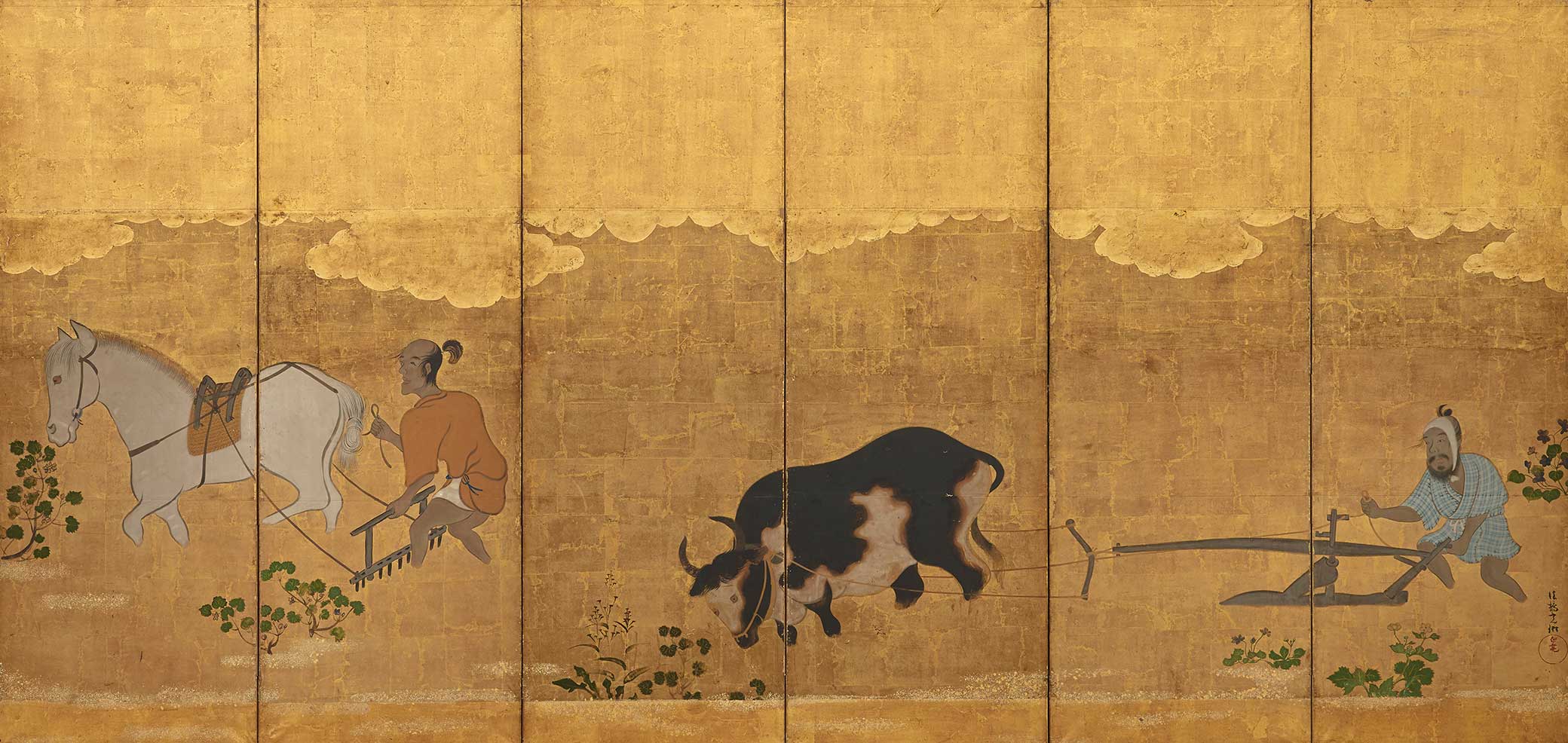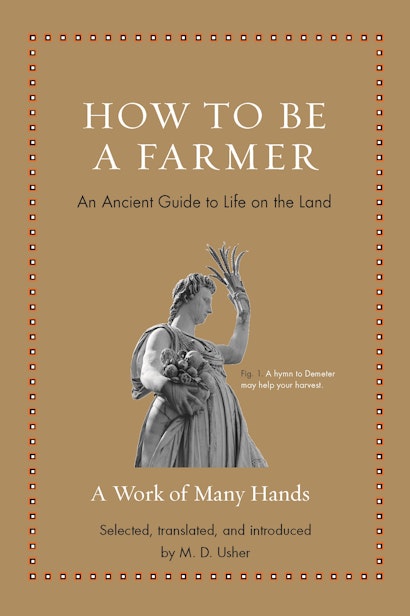
Two farmers plowing and harrowing a rice field, Edo period. Smithsonian Institution, National Museum of Asian Art, gift of Charles Lang Freer.
Musonius Rufus was a philosopher of the Stoic school who taught at Rome during Nero’s reign and wrote in Greek. That he would find farming an ideal occupation for philosophers is consistent with the Stoics’ belief that philosophy is no respecter of persons but is open to all, as Musonius’ contemporary Seneca argues forcefully in his 44th Letter to Lucilius.
Indeed, the Stoics could boast among their greatest sages not only a rich man of letters like Seneca but a Greek ditchdigger who began his career as a boxer (Cleanthes), an ex-slave from Phrygia (Epictetus—Musonius’ student), and the Roman emperor Marcus Aurelius. Musonius’ argument here that the manual labor required of farming poses no impediment to the deliberate pursuit and acquisition of virtue—the natural end toward which, according to the Stoics, human beings should strive—is a muted criticism of Aristotle, who felt that it did.
There’s yet another way to earn a living not inferior to this one. In fact, it could be considered a better way, and not without reason, at least for a man who has some bodily strength—namely, a livelihood gained from the land, whether one owns his own property or not. Indeed, many people who farm land that does not belong to them, be it public land or private, are able to provide not only for themselves but for their wives and children, too.
Some even prosper to the point of having a surplus from farming if they are industrious and amenable to hard work. For the land repays the most just and beautiful returns to those who care for it, giving back many times more than it receives and offering an abundance of life’s necessities to the person who is willing to work. These are respectable undertakings; there’s no shame in them. It’s only someone delicate and soft who would say that farmwork is unsuited to an honest man. How could planting not be a noble endeavor? How not plowing, or pruning vines? Sowing, harvesting, threshing—are all these not tasks for the freeborn and appropriate for good men? Shepherding, too: Hesiod wasn’t ashamed of it; nor did it prevent him from being a poet, and dear to the gods. So neither would it hinder any other person.
The most pleasing aspect of all farmwork is that it affords the mind more free time to think and to investigate matters that have a bearing on one’s moral development. Of course, work that exerts the body and exhausts it compels the mind to be also closely engaged with that work to the exclusion of all else, and to experience an exertion of its own along with the body. However, work that does not exert the body to excess does not keep the mind from pondering more important things and, upon such reflection, from becoming wiser than it was, which is the aim of every philosopher.
For these reasons, I am particularly keen on shepherding. But regardless, if someone pursues philosophy and farming together, I would not compare any other way of life to this, nor would I prefer any other means of obtaining a livelihood. For how is it not more in accordance with Nature to be nourished by the Earth, our nurse and mother, than by some other source? How is it not more manly to live in the countryside than to be sedentary in the city like the sophists? How is it not healthier to spend your time outdoors than to be cooped up inside? How is it not more conducive to freedom to acquire one’s own necessities oneself rather than receive them from others?
Clearly, as far as one’s own needs go, not to require things from someone else is much more dignified than to do so. Indeed, just how fine and happy and a mark of divine favor it is to live by farming—so long as good character is not neglected—is shown by Myson of Chenae, whom the god declared “wise,” and Aglaus of Psophis, whom he pronounced “happy.” Both lived by the work of their own hands in the countryside and kept away from city life.
Is it not then worthwhile to emulate and imitate these men and embrace farming with enthusiasm? Someone might say, “Is it not unusual for an educated person with the power to put young people on the path of philosophy to work the land with physical labor just like a peasant?” Yes, it would be unusual, if in fact working the land prevented someone from being a philosopher or helping others pursue philosophy.
But the fact is, it seems to me, that young people would be helped more not by associating with their teacher in the city, nor hearing him lecture at school, but by seeing him engaged in agricultural tasks whereby he demonstrates in practice exactly what reason instructs—namely, that one must toil and experience physical hardship rather than depend for sustenance on someone else. What’s to keep a student while he’s busy at work from listening to his teacher on the topics of, say, self-control, justice, or endurance? You do not need a lot of speeches to teach effectively if you are a philosopher.
Young people certainly don’t need to master the throng of theorems we see the sophists puffing on about. There are enough of those to consume a person’s lifetime! It is possible to learn what is most essential and useful in addition to performing farmwork, especially if one is not laboring nonstop but can enjoy some breaks. Now I know full well that few will want to learn in this manner. Yet it is better for young people who declare their interest in philosophy not to go see a philosopher.
I refer to those would-be students who are unsound and soft, because of whom philosophy has become replete with defilements. But among the true lovers of philosophy, there isn’t anyone who would not want to bide his time with an honest man in the countryside, even if the locale proved quite challenging, since he would reap great benefits from this way of life, associating with his teacher day and night, far away from the pitfalls of the city, which are an obstacle to the pursuit of philosophy. Moreover, that you can’t escape notice when you do something, whether it be done properly or poorly, is a tremendous advantage to those receiving instruction. To eat, drink, and sleep under the supervision of an honest man is also a great boon. The results that inevitably arise from time spent together in the country are praised by Theognis in these lines, where he says:
Drink and eat among men whose power is great;
sit in their midst; impress them.
That Theognis means honest men specifically have great power for the people’s benefit if someone joins them in eating, drinking, and sitting down together he has shown in the following lines:
From noble men you will learn noble things; if you mingle
with the base, you will lose even what sense you had.
And so let no one say that farming is an obstacle to learning or teaching what one must, for that’s just not the case, especially in a situation where the learner lives in the closest proximity to the teacher and the teacher in turn has the student close to hand. When this kind of arrangement is in place, a livelihood gained from farming is clearly the most suitable for a philosopher.
Excerpted from How to Be a Farmer: An Ancient Guide to Life on the Land, selected, translated, and introduced by M.D. Usher. Copyright © 2021 by M.D. Usher. Reprinted by permission of Princeton University Press.
